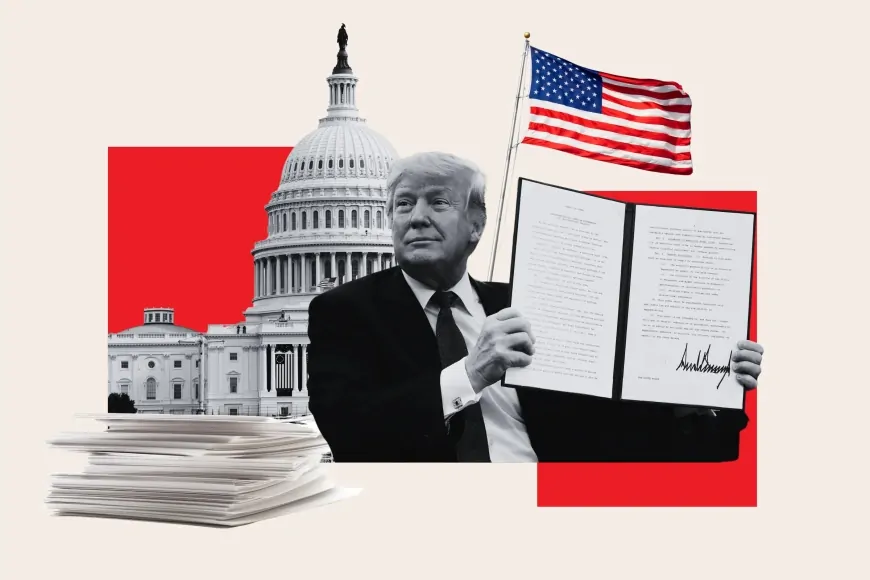Complete List of Executive Orders Signed by President Trump on His First Day in Office
President Trump enacts major executive orders on his first day, including exiting the Paris Accord, declaring a border emergency, and delaying the TikTok ban.

WASHINGTON, D.C. – President Donald Trump, on his first day back in office, enacted a series of executive orders aimed at making immediate changes and reinforcing the United States' global standing. The announcements were made during a gathering with supporters at the Capital One Arena and continued after his return to the Oval Office.
One of the key actions was an executive order withdrawing the United States from the Paris Climate Agreement, signaling a sharp departure from international climate policies.
In addition, President Trump declared a national emergency on the Southern Border, designating criminal cartels as terror groups. He also issued an executive order to end birthright citizenship for children born to undocumented immigrants, a controversial policy shift with potential legal challenges ahead.
Also Read: Donald Trump Kicks Off Second Term with Sweeping Executive Orders
Back at the White House, the president took steps to address the fallout from the January 6 Capitol riots. He pardoned more than 1,500 individuals charged in connection with the events of that day, including commuting sentences for several convicted participants.
Other notable executive orders included renaming the Gulf of Mexico to the "Gulf of America," a move that sparked immediate debate, and delaying the TikTok ban by 75 days. The social media platform had gone dark temporarily on Sunday as the ban took effect but resumed operations shortly thereafter.
Disclaimer: This article references executive orders from the official White House website: White House website
Follow our live updates for the complete list of executive orders signed by President Trump on his first day in office:
Key Moments
- U.S. exits Paris Climate Agreement.
- Border emergency declared; cartels named terrorists.
- Birthright citizenship for undocumented ended.
- 1,500 January 6 riot pardons issued.
- TikTok ban delayed by 75 days.
-
U.S. Withdrawal from the Paris Climate Agreement
President Trump has officially signed an executive order to withdraw the United States from the Paris Climate Agreement. The order marks a decisive step away from international climate commitments, fulfilling a promise made during his campaign. The withdrawal aims to protect American industries from what the administration views as unjust economic burdens imposed by the accord, shifting the focus to energy independence and domestic economic growth.
-
National Emergency at the Southern Border
To address ongoing security concerns, President Trump declared a national emergency at the U.S. Southern Border. The executive order designates criminal cartels as terrorist organizations and directs federal agencies to ramp up efforts to combat illegal immigration, drug trafficking, and human smuggling. The declaration grants the president expanded powers to secure the border and implement policies to protect American citizens from criminal activities related to border crossings.
-
Ending Birthright Citizenship for Children of Undocumented Immigrants
President Trump signed an executive order to terminate birthright citizenship for children born in the U.S. to undocumented immigrants. The order challenges a long-standing interpretation of the 14th Amendment, aiming to curb "birth tourism" and prevent illegal immigrants from obtaining U.S. citizenship through their children. This change is part of the administration’s broader efforts to overhaul immigration policies and reduce illegal immigration.
-
Pardon for Capitol Rioters
President Trump issued pardons for over 1,500 individuals charged in connection with the January 6 Capitol riot. This executive order grants clemency to those involved in the storming of the Capitol, including commuting the sentences of several convicted participants. The decision is framed as an effort to foster national healing and reconciliation following the divisive events that threatened the democratic process.
-
Renaming Mount McKinley to Mount McKinley
President Trump signed an executive order to reinstate the name “Mount McKinley” to North America’s highest peak, reversing the Obama administration's 2015 decision to rename it Denali. The order honors the legacy of President William McKinley, who led the nation through the Spanish-American War and contributed to the economic growth of the U.S. The Secretary of the Interior is tasked with updating the Geographic Names Information System to reflect the change within 30 days.
-
Renaming the Gulf of Mexico to Gulf of America
President Trump signed an executive order renaming the Gulf of Mexico to the “Gulf of America.” The Gulf has long played a crucial role in America’s trade, energy production, and maritime industry. The order directs the Secretary of the Interior to update official maps and records to reflect the new name, symbolizing the importance of the Gulf in the U.S. economy.




































































